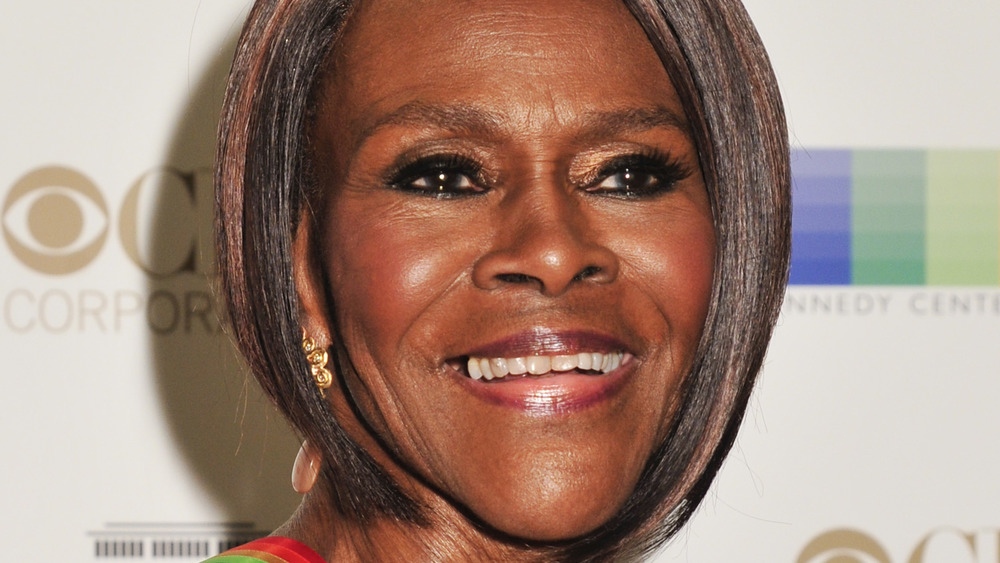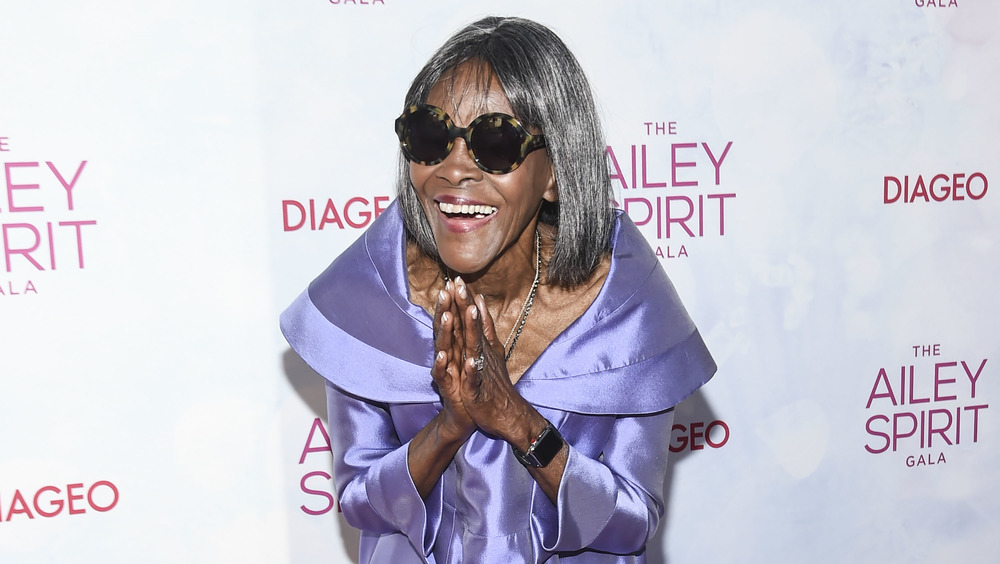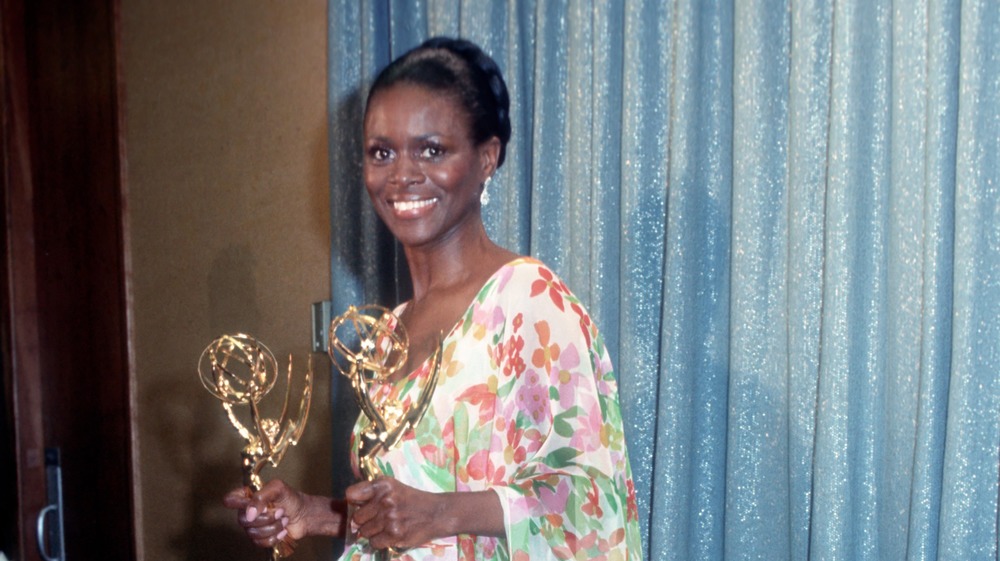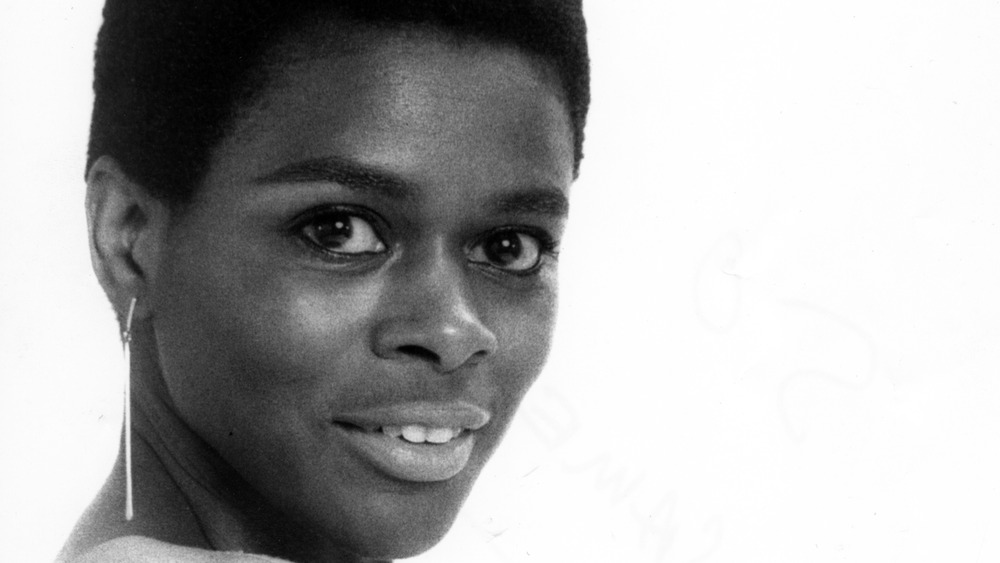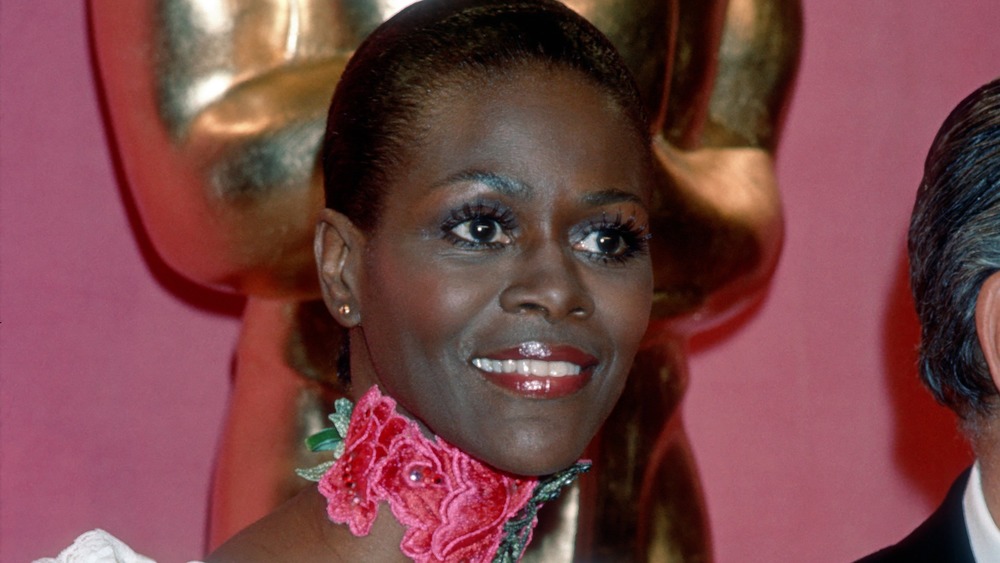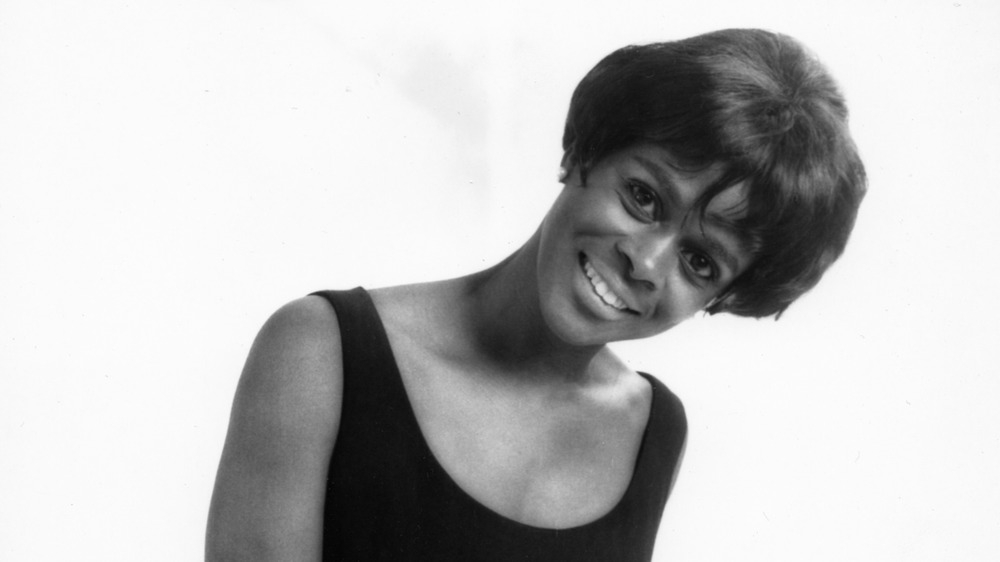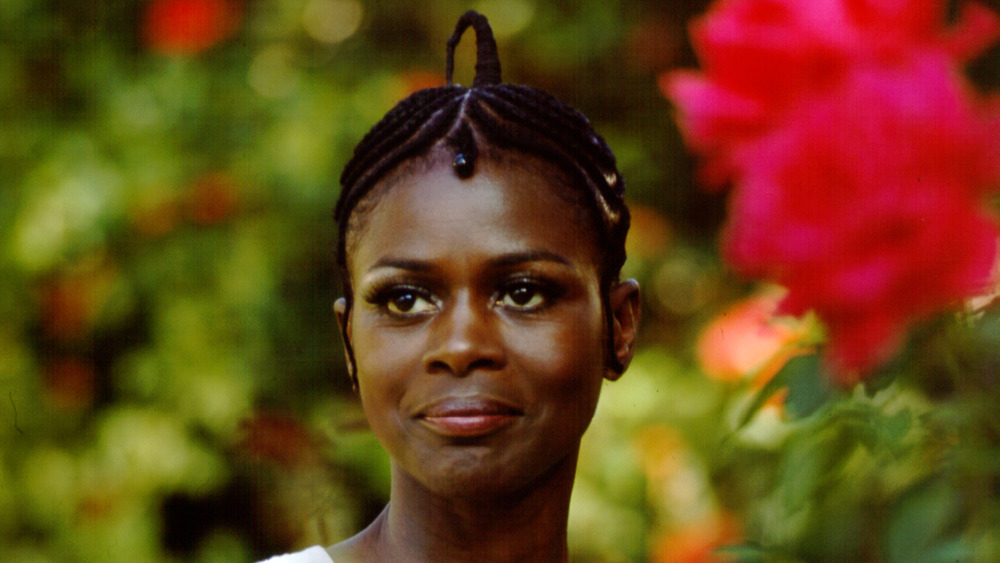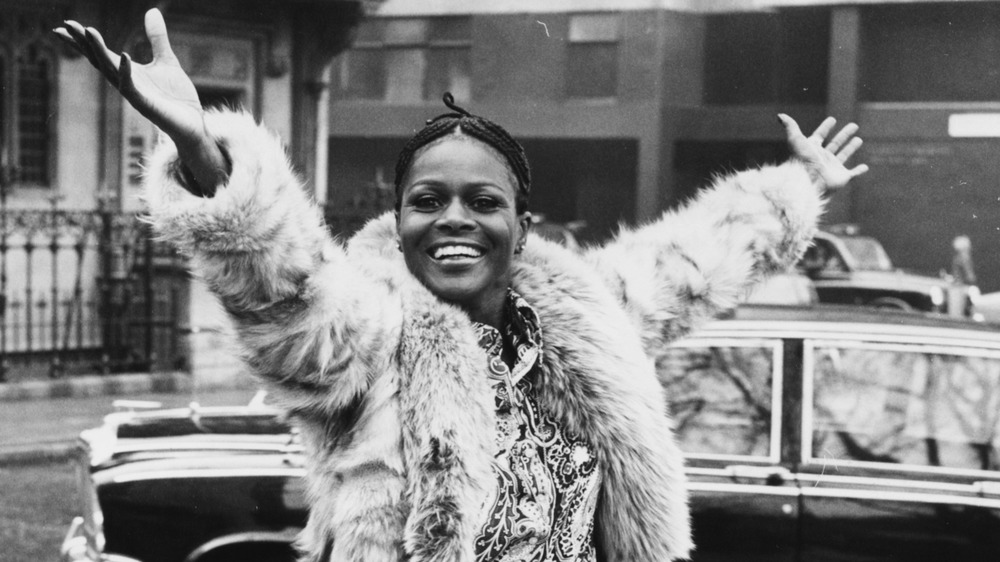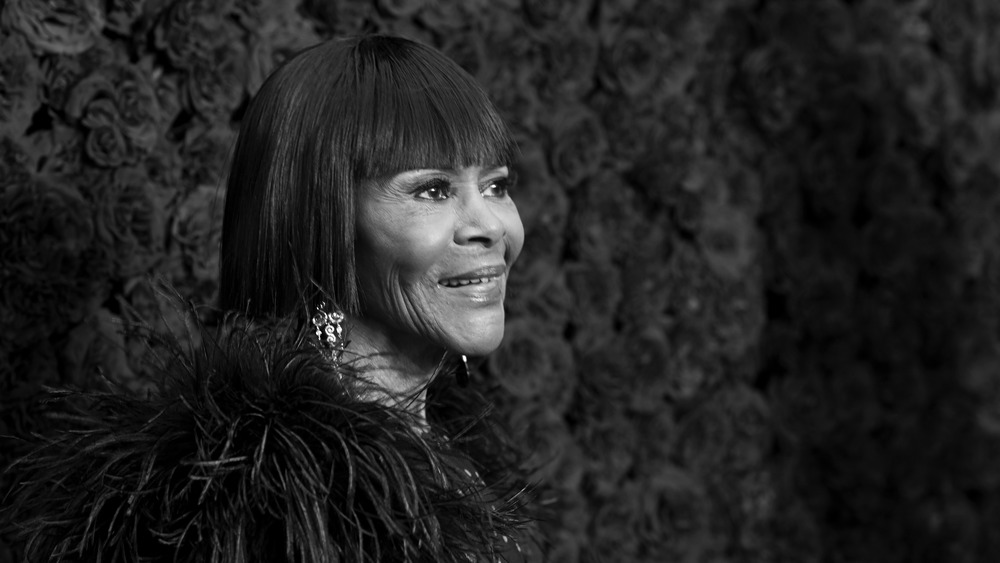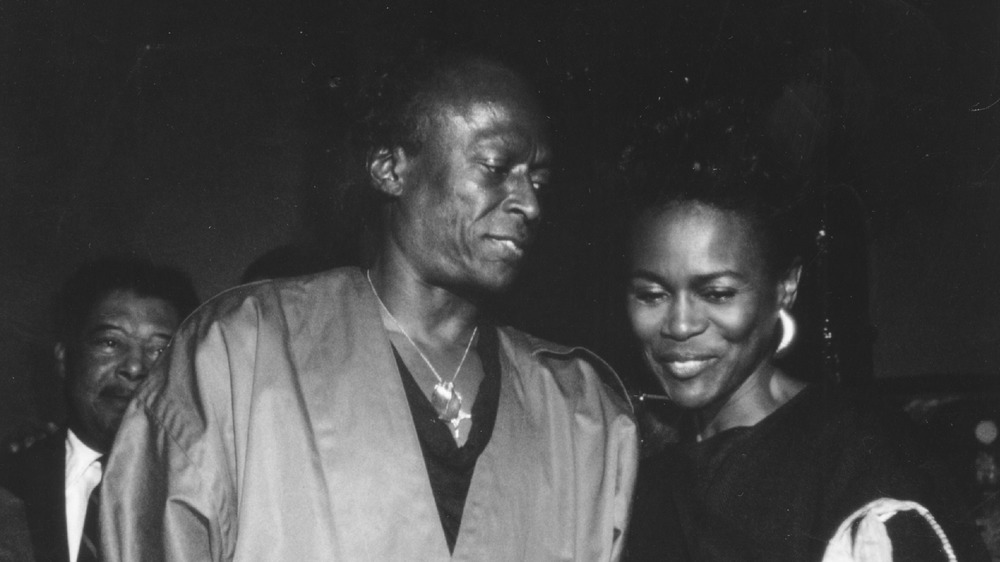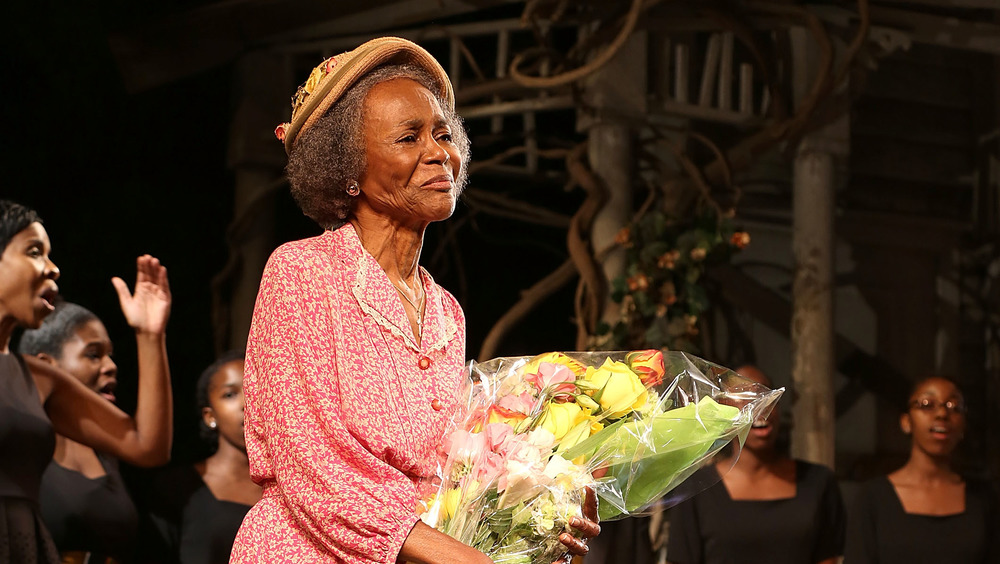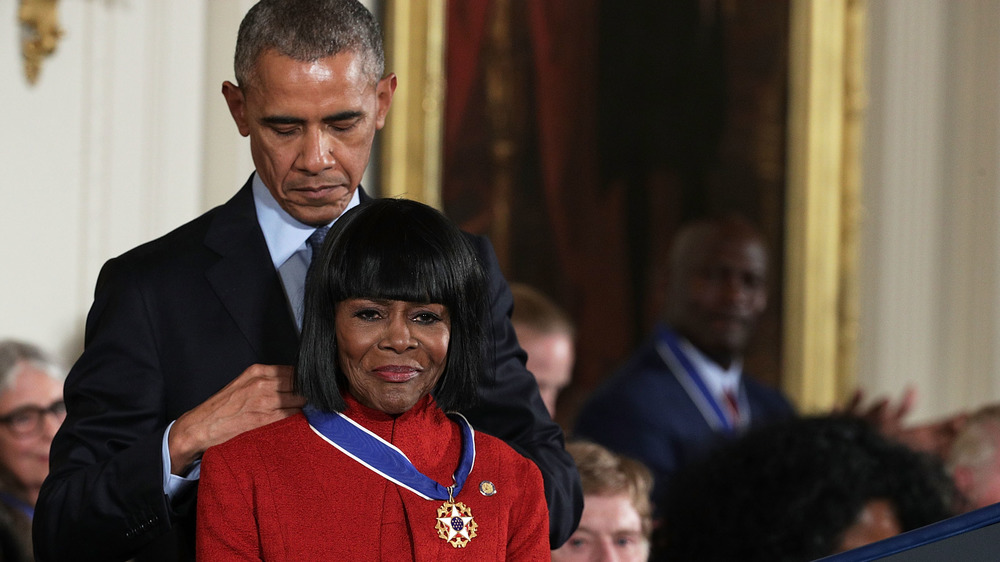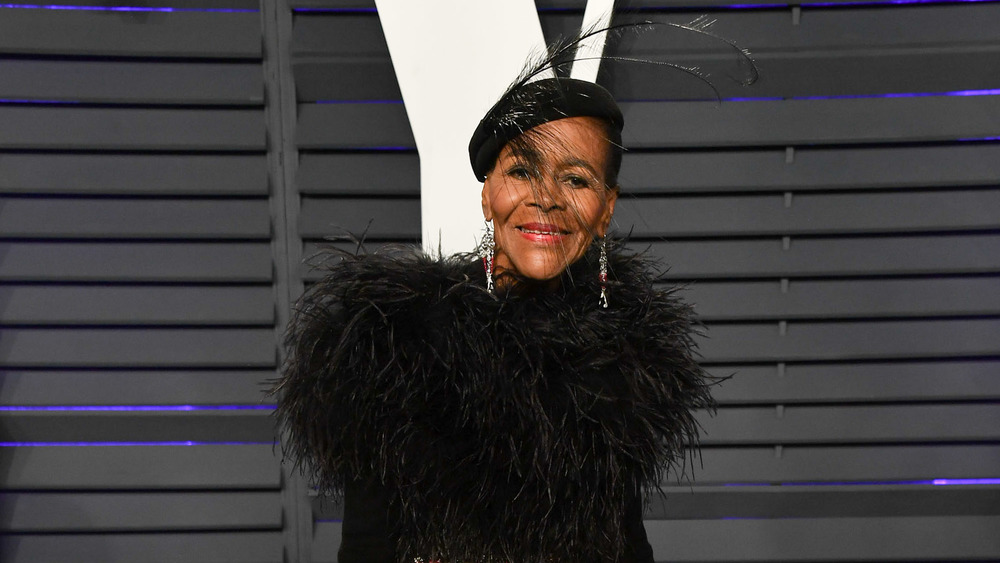The Untold Truth Of Cicely Tyson
Cicely Tyson came to fame in the '70s for the films Roots and The Autobiography of Miss Jane Pittman. She is labeled an icon for having a career that spanned six decades and a reputation for being refined, elegant, fashionable, and bringing a depth to her characters never seen before. What is striking about her life is that she seemed to always be on a path bigger than her career. She didn't set out to be an actor, but when she became one, she chose parts based on their merit and was never afraid to turn down a role she did not think portrayed women with dignity.
Tyson has received numerous awards, honors, and accolades throughout her career: An Academy Award nomination for her work in the film Sounder, 17 Emmy nominations (with three wins), a Peabody Award, a Tony Award — the list goes on and on. But what she truly leaves behind is a legacy of talent and inspiration.
Cicely Tyson never planned on being an actor
When asked how she became an actor in an interview with NPR, Cicely Tyson said, "Well, it happened because I learned that I could speak through other people. I was a very shy child." She went on to say, "I never spoke ... but I was a great observer." In another interview for Elle magazine, Ms. Tyson said she "never thought of being an actress." She was born into a religious family that went to "church from Sunday morning to Saturday night." Her introduction to film, theater, and music were all orchestrated through her church. She said, "The church was really where, subconsciously, I was sopping up all of this — whatever I use now — to perform."
Ms. Tyson was discovered by a photographer for Ebony magazine. She was working as a typist in New York City and enjoyed "perusing" at Lord & Taylor off Fifth Avenue on her lunch break. One afternoon, according to her interview with NPR, "someone tapped me on the shoulder and asked for my agency. And I asked, 'What agency?' They said, 'Aren't you a model?' I said no. And they said, 'Well, you should be.'" Soon after, Tyson started sending her photos to agencies and began getting calls.
Cicely Tyson's mother did not support her career
Cicely Tyson was born in Harlem, New York. Her parents were both working-class immigrants from Nevis in the West Indies. According to News Americas Now, Cicely's parents divorced when she was very young, and her mother became her main guardian. While still living at home, Cicely's modeling career took off. She was featured in top magazines and walked the runways. Cicely said, in an interview with Time magazine, that when she was approached to work on a film, her mother told her, "You can't do that." She ended up kicking Cicely out of the house, and they didn't speak for over a year.
Soon after, Cicely was cast in her first feature film, Carib Gold, a 1957 B-film taking place in the Florida Keys with a predominantly Black cast. When asked in her Elle interview if her mother was ever proud of her, she said, "...when I did Jane Pittman I was in California — she was still in New York — and I called her and said to her, "Well? You've got to give me something!" She said, "I am so proud of you." Cicely Tyson credits her mother with being a "source of energy" she used to "prove her wrong."
Cicely Tyson was the first Black woman to wear her hair natural on television
In an interview with InStyle, Cicely said she is often credited for starting the natural-hair movement. In 1962, she auditioned for a role in a CBS drama called Between Yesterday and Today. Cicely said, "they told me to leave my hair straightened, but I knew this woman [her role] would wear her hair natural." She went to a barbershop in Harlem and had them cut her hair short and shampoo it. On-set, she kept her hair covered until it was time to shoot. When the director saw her hair, short and natural, he said, "I wanted to ask you to do it, but I didn't have the nerve."
In 1963, Tyson went on to star in East Side/West Side, a TV show for CBS, and decided to keep her hair natural. The studio received letters, some praising the decision and some criticizing it. According to Cicely, "Other people told me I was in a position to glorify Black women, and I had disgraced them instead. I was not trying to be groundbreaking that day, but that one small choice still has effects today." According to HuffPost, she also caused a stir when she wore cornrows in the 1972 film Sounder. Cicely said, "Every time I changed a hairdo, it had not to do with me. It had to do with authenticating the character that I was playing."
Cicely Tyson turned down an Academy Award-nominated role
In 1972, Cicely Tyson starred in the film Sounder, a children's film about a family of sharecroppers and their dog, Sounder. This role earned Tyson an Academy Award nomination for Best Actress in a Leading Role, making her the second Black woman to receive this honor, which she shared with Diana Ross, who was also nominated that year for her role in Lady Sings the Blues. After the success of Sounder, she was offered the leading role in the film Claudine.
In an interview with Time magazine, Cicely recalled, "I once turned down a movie that everybody thought I was crazy to do, because it wasn't the kind of woman I wanted to project. Another actress did it, and she got a nomination for an Oscar." That woman was Diahann Carroll, who played the title role in Claudine. Cicely said, "It has never been easy for us to get roles — roles of enough substance, of any substance..." (via Elle). Despite the scarcity of roles, Cicely Tyson remained picky about which ones she took. She cared a lot about how her image as a Black woman was projected, and it was a decision she never regretted. A week after turning down Claudine, she was given the chance to play Jane Pittman in The Autobiography of Miss Jane Pittman, for which she won two Emmys and became well-known.
Cicely Tyson went the extra mile when researching for roles
The Autobiography of Miss Jane Pittman was a made-for-TV movie about a woman who was 110 years old in the 1960s and a former slave. When discussing her preparation for the role of Pittman to Elle, Cicely said, "I did a tremendous amount of research. I need to feel as though I am in the person's skin." To get the hang of playing an elderly person, she visited a nursing home and spent time with those older than her — noting how they talked, walked, and held themselves. According to The Hollywood Reporter, the TV movie racked up 13 Emmy nominations, not to mention two more wins for Tyson, who said that the movie "marked the end of my anonymity."
In 2013, Cicely Tyson starred in the Broadway revival of The Trip to Bountiful. To prepare for the role, she went to Texas, where the play was set, because she had never been there before. In her interview with Time, she said, "I was just going to get a ticket and fly out there and roam around and eat and smell and dance and sing and whatever she did." But CBS decided to make an entire behind-the-scenes documentary about her trip. She visited the small town of Wharton, where the playwright Horton Foote grew up and wrote about in Bountiful. Cicely Tyson won a Tony Award for performance.
Cicely Tyson befriended Alex Haley before getting the role for Roots
After reading the book Roots, Cicely Tyson met with Alex Haley. According to HuffPost, Tyson said, "...we spent a lot of time together. Because all I have to do is find someone who has something to say that will enrich my life and they can't get rid of me," Soon after, she was granted the part of Binta, Kunta Kinte's mother. The film was released in 1977, and Tyson was again nominated for an Emmy.
Like all other parts she played, Tyson did a lot of research, but this time, she went to Africa before getting the part. She went to the former Kingdom of Dahomey, now called Benin, a country west of Nigeria. She said, "I had an opportunity to get a feel of the country itself. Made lots of notes, take the dialogue [in], just wanting to get to know who my forefathers were. I spent a lot of time with the women, not being aware that this role was forthcoming."
According to an interview she did with Oprah, Cicely Tyson's mother passed away right before she landed the role of Binta. She spoke with Oprah about how she was able to use her grief to bring her character to life, stating, "I think that I have profited more from the negative as opposed to the positive. [...] I really relish and treasure them more than positive. [...] It has enriched my life more."
Cicely Tyson had a daughter at age 18
For the majority of Cicely Tyson's career, she kept her personal life private. According to People, Tyson dedicated her memoir Just As I Am to her daughter "Joan," "Joan" being a pseudonym for her daughter's real name in an effort to respect her privacy. Tyson's dedication described her daughter as "the one who has paid the greatest price for this gift to all" and ended with "Love, Mom."
In 1942, Tyson married her first husband Kenneth Franklin and gave birth to their daughter in 1943. The couple divorced when Joan was only two years old. Cicely moved back in with her mother, who helped to raise her daughter while Cicely worked multiple jobs to support them.
Later, Cicely sent her daughter to a boarding school far away. According to Yahoo!, Cicely's memoir "described the great distance between them as painful." Tyson wrote, "Joan felt, as a child, that she had to share me with the world. I give her now, in adulthood, what my heart has always longed to bestow — my undivided focus, along with the full measure of her privacy."
Cicely Tyson lied about her age
According to a People magazine article from 1974, "More than all the other actresses who have tried, Tyson keeps her age, which could be close to 40, a secret. When pressed, she quips, 'I could be anywhere from 19 to 110.'" That's a joke from her Jane Pittman role because she played a woman from age 19 to 110. Also, in 1974, Cicely Tyson, who was born in 1924, would have turned 50, not 40.
The People article tells a story about how in the mid-1950s, when Cicely was 18 years old, she quit her job as a typist — except Cicely would have been in her late twenties or early thirties. As it turns out, Cicely did not start modeling until she was 30. She didn't win an Oscar until she was 50, and she didn't win a Tony until she was 88. And when her mother kicked Tyson out, her own daughter was most likely already a tween or teenager. Many actors, women especially, lied or kept their age a secret to create longevity in their career. For Cicely, who continued to perform until she died at age 96, it worked!
Cicely Tyson had a relationship with Miles Davis that spanned decades
Miles Davis and Cicely Tyson met in New York in 1966. According to the Los Angeles Times, Davis remarked, "She had a different kind of beauty that you didn't usually see in Black women on television; she was very proud-looking and had a kind of inner-burning fire that was interesting." In 1967, he used her face for the cover of his album, Sorcerer.
According to Miles: The Autobiography, by 1968, Davis had married another woman, Betty Mabry, and they divorced in 1969. After, there was a long period where Davis sank into a deep cocaine addiction. Toward the end of the '70s, at the height of her career, Cicely Tyson came back into Davis' life. She helped him deal with his addiction, and the two married on Thanksgiving Day in 1981 at the home of Bill Cosby. Miles began composing music again and released two albums, one of which had a song titled "Star on Cicely."
Miles Davis wrote of how the couple had trouble getting along and fought regularly. He even confessed to having an affair days after their wedding. While their relationship was on the downslope for many years, it was not until 1989 that their divorce was final. In 1991, Miles was hospitalized for "organ failure after decades of drug and alcohol abuse." Tyson was not able to see him before he died, but a friend of hers relayed a message from Davis: "Tell Cicely I'm sorry. Tell her I'm very, very sorry" (via the LA Times).
Cicely Tyson had a stage career long before winning a Tony at age 88
Before Cicely Tyson became a household name, she was a stage performer. Her first performance was at the Little Theater in Harlem in 1957 for a play called Dark of the Moon. In 1959, she was an understudy for Eartha Kitt in the Broadway play Jolly's Progress. Her most notable success would be in the play The Blacks, written by French playwright Jean Genet. According to Playbill, "The show would run 1,408 performances at the St. Mark's Theater. Among the actors to pass through the cast were then-unknowns James Earl Jones, Roscoe Lee Browne, Lou Gossett Jr., Cicely Tyson, Billy Dee Williams, Charles Gordone and Maya Angelou."
Her breakout role on East Side/West Side in 1963 may have slowed her stage career down, but it didn't stop it: Cicely came back here and there, such as for Carry Me Back to Morningside Heights in 1968 and the Corn is Green in 1983. According to Broadway.com, it would be three decades until Tyson returned to Broadway for her Tony-winning turn in The Trip to Bountiful. Upon accepting the award, Tyson said, "I had this burning desire to do one more. One more great role. I didn't want to be greedy; I just wanted one more." Well, she did two more. Her last play was in 2015, opposite James Earl Jones in The Gin Game.
Cicely Tyson was awarded a presidential medal of freedom by Barack Obama
On November 22, 2016, Cicely Tyson, along with 20 other recipients, was awarded the Presidential Medal of Freedom. She was 91 years old. Like her character Jane Pittman, Tyson had lived through decades of slow progress — in this case to finally seeing the first Black president. According to Essence, reporting on the event, Obama said, "In her long and extraordinary career, Cicely Tyson has not only exceeded as an actor, she has shaped the course of history," remarking on her choice to only take on roles that showed depth and character.
In 2018, Cicely Tyson was honored by Turner Movie Classics with a hand-and-footprint ceremony in front of Grauman's Chinese Theatre. As USA Today put it, "Cicely Tyson's legend is being cemented into film history." Then, in 2019, Cicely Tyson became the first woman of color to receive an Honorary Academy Award. At age 94, she walked the red carpet, and according to Harper's Bazaar, "Tyson's appearance on the red carpet tonight sparked a rapturous response from industry insiders and fans alike."
Cicely Tyson died at age 96 and had no plans of retiring
Cicely Tyson died on January 28, 2021, just two days after her memoir Just As I Am was released. She was in the middle of a book tour and had no plans of slowing down. According to Vulture, she did her last interview on Live with Ryan & Kelly just a day before she passed. When asked by Time magazine in 2019 on why she hadn't yet retired, she said, "The reason why I have been in this universe as long as I have been is because he's not ready for me. When I've completed my job, he'll take me away." Tyson was still working in TV with a recurring role on How to Get Away With Murder.
There was an outpouring of lamentations over the icon's death from the many fans and actors she inspired, specifically Black women. Viola Davis wrote an entire article for Vanity Fair about how Cicely Tyson was always her "muse." She said, "Ms. Cicely Tyson is elegance personified. She is excellence. She is courage. When I think of her, I think of the Stevie Wonder song: 'Show me how to do like you. Show me how to do it.'" According to the Associated Press, after Tyson's death, celebrities paid homage. Viola Davis stated that because of Cicely, she felt "valued in a world where there is still a cloak of invisibility for us dark chocolate girls." Kerry Washington described Tyson as a "foretaste of glory." Zendaya, meanwhile, proclaimed Tyson as "one of the greatest to ever do it."
